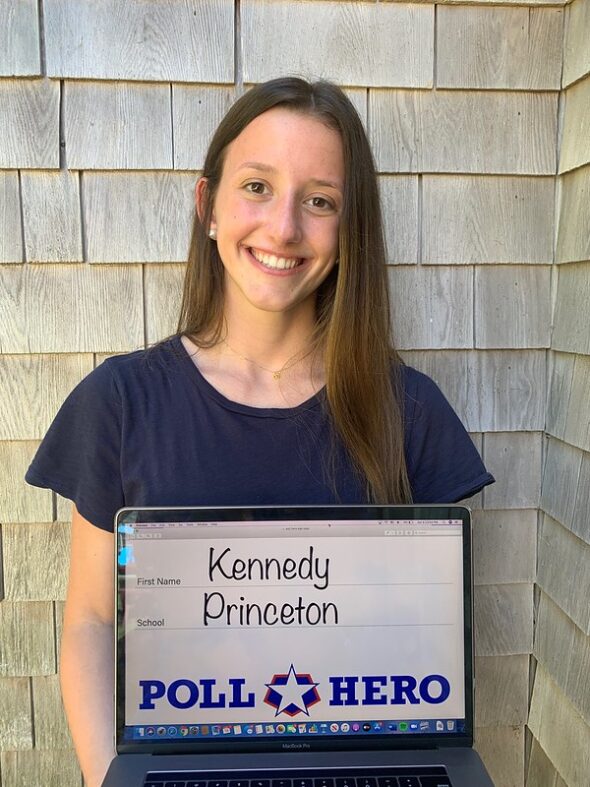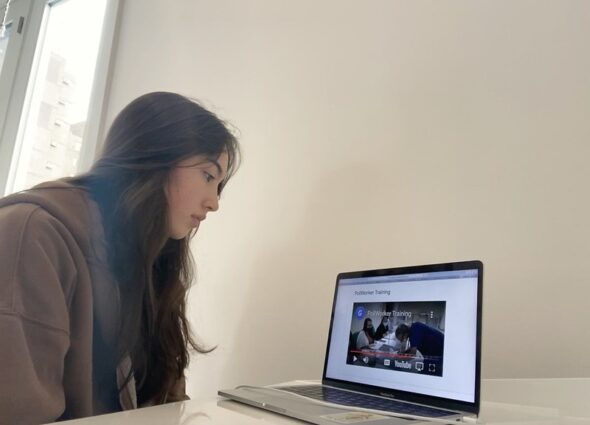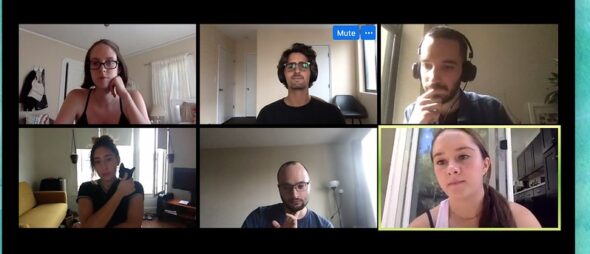Kennedy Mattes was 16-years-old when she watched the mass murder of high school students in Parkland, Florida on television. It scared her. Fourteen students and three faculty members were dead, killed by a 19-year old gunman armed with a semi-automatic rifle. It was the deadliest high school shooting in U.S. history. Mattes stayed up until 2 in the morning, scrolling through articles about the shooting. It was then that she knew she could not sit idly by. It was time to step up.

Kennedy Mattes, co-founder of Poll Hero, shows she is a registered poll worker through a Poll Hero certificate. Photo by Kennedy Mattes.
“I lost trust in our institutions,” Mattes of Cincinnati, Ohio said. “It seemed as if everyone knew the dangerous capabilities of the shooter, yet nothing could be done proactively. It was then that I realized I had to take it upon myself to advocate for the necessary changes.”
Frustrated by not being old enough to vote, she organized students across Ohio to write to senators to support gun legislation.
Now a 20-year-old student at Princeton University and first time voter, Mattes is on the front lines again. She co-founded Poll Hero, an organization that aims to protect democracy by recruiting high school and college students to volunteer as poll workers. Since their launch in July they estimate sign ups of over 35,000 poll workers.
What originally started as a project focused on funding for vote-by-mail, it shifted after a nationwide shortage of poll workers became apparent. Mattes said they were motivated by the struggles election officials in Philadelphia were having in finding poll workers for the primaries during a pandemic.
“We came up with the idea to focus on recruiting high school and college students to become poll workers for the election,” she said. “Because we are students, we have a generally good idea how to recruit our peers.”
Historically, a large share of poll workers have been older. According to the Election Administration and Voting Survey, in the 2018 general election, 31% of poll workers were between the ages of 61-70 and 26% were 71 or older. But these older folks are reluctant to work the polls due to their vulnerability to COVID.
“The consequences have already been felt in recent primaries, where poll worker shortages led to long lines and the closure of polling places,” Scott Duncombe, co-director of Power the Polls, said. “Washington D.C. lost 1,700 election workers during its primary in early June. Similarly, Kentucky consolidated in-person voting in each county to a single polling place during the primary due to poll worker recruitment concerns.”
When Poll Hero started, they zeroed in on the city of Milwaukee which had drastic polling closures due to lack of workers. Mattes said the city now has over 173 polling locations and they’re no longer taking applications, by far the most extreme outcome from polling recruitment.
Kai Tsurumaki, 19, and co-founder of the Poll Hero Project, said it was the tumultuous landscape of politics that pushed him to step up. He’s been more and more motivated to do his part in making sure elections are free and fair, and speaking up for issues that he believes in. He said Poll Hero is somewhat of a result of his advocacy over the past few years.
“Some of the chaos of this year and social movements have made my generation, Gen Z, really energized and really excited to participate in democracy, politics, and activism,” Tsurumaki said. “Part of the project’s success is from being able to tap into that energy and enthusiasm for democracy and politics.”
In a global survey of Gen Z ages 15-24, The Irregular Labs found 75% of respondents said being politically or socially engaged is a fundamental part of their identity. And with a year of a global pandemic, protests around the world, and political turmoil, this generation is taking it upon themselves to ensure every voice is heard and counted in this upcoming election.
“So many of us over the summer were going to protests and were educating ourselves about social issues,” said Lucy Duckworth, a 17-year-old high school student from Philadelphia who is working the polls this election. “We’re all trying to find more ways of contributing. Being a poll worker is such a novel and concrete way to do that.”
Duckworth emphasized the importance of showing up to the polls.
“The more people who vote, the more of an accurate reflection of our government in who gets elected,” said Duckworth. “We need to represent as much of our population as we possibly can.”

Lucy Duckworth takes her poll working training virtually. Photo by Lucy Duckworth.
For Evan Malborough, it’s always been about involvement. Hailing from Atlanta, where there’s a historically rich undertone of black history and service, he said when it came time to pick a career, it was the assumption he would engage into that culture as well.
Evan is the 22 -year-old founder of The Georgia Youth Poll Worker initiative and has been involved in voter registration since 2015. Working the polls for the first time during the primaries showed him the need for young people to step up and become poll workers. Since July 1 he’s estimated his initiative has recruited over 1,000 students to work the Georgia election. And when he’s not recruiting poll workers, he’s leading poll worker training. Since July, he’s taught over 70 classes.
“Democracy needs workers and students need work.” Malborough said. “Democracy has seen a massive shortage of people working and students need money. I became a poll worker because I lost my internship. How many students like me are there? This a surefire way to make money while also securing democracy. It’s a win-win.”
Samuel Ravetz, 27, is the co-founder of Save Our Democracy!, and is mobilizing his own efforts. After doing research on progressive organizations, he came to the realization that there’s a gap between people who are interested in getting involved and finding organizations that fit their passions. Save our Democracy aims at streamlining the process by offering personalized volunteering recommendations.

Samuel Ravetz, and other members of Save our Democracy, hold a virtual meeting. Photo by Samuel Ravetz.
“You take a six question quiz and get three personalized recommendations based on your answers,” Ravetz said. “We don’t have established partnerships – we let them know we’re going to highlight them – but we then give users a link where they can go and sign up to become a poll worker.”
Ravetz received nearly 462 quiz completions within one hour.
All but three states require training for the polls, which can be long and tedious and require passing an exam. Eighteen states allow split shifts for poll workers, but it’s not uncommon for a volunteer at an election site to work anywhere from a 12 – 15 hour shift. And while it may not be the most luxurious job, Mattes said she’s excited young people are still doing it.
“Becoming a poll worker is still a job,” Mattes said. “Your water and food breaks are limited. You can’t take off your mask. It’s not like you’re stepping into a very easy job. It’s still work. And I think it’s cool to see that students are still stepping up. It’s not that they’re doing this because they have to. They’re doing it because they want to.”


Comments
Such important information to share during these tumultuous times.